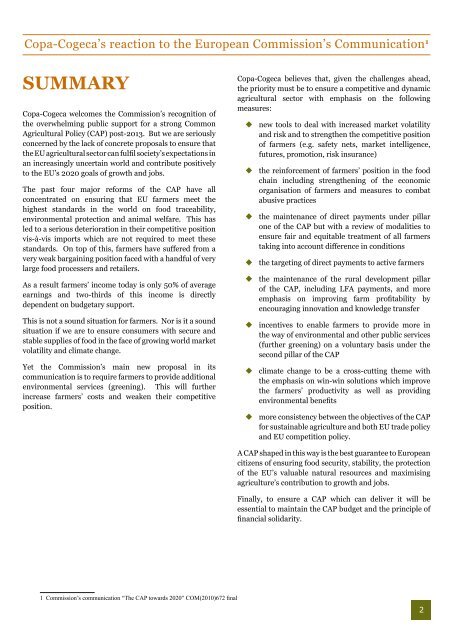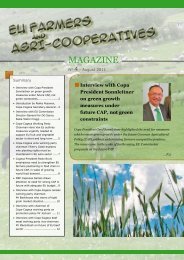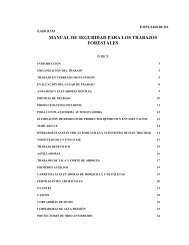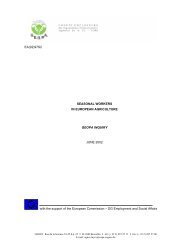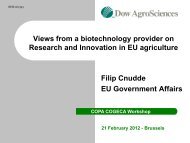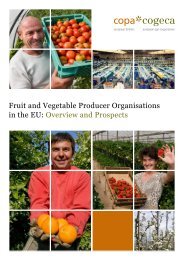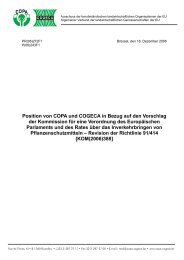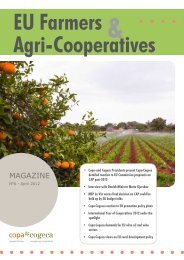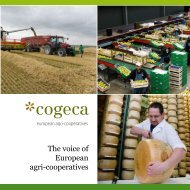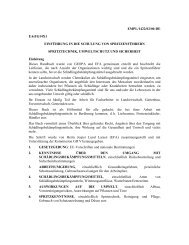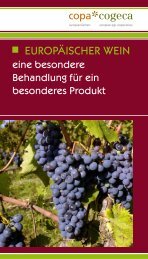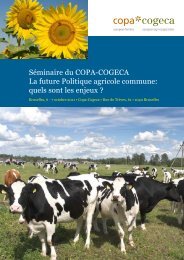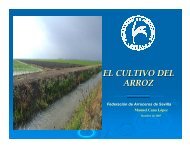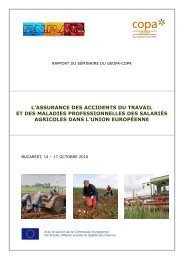The Future of the Common Agricultural Policy post ... - Copa-Cogeca
The Future of the Common Agricultural Policy post ... - Copa-Cogeca
The Future of the Common Agricultural Policy post ... - Copa-Cogeca
You also want an ePaper? Increase the reach of your titles
YUMPU automatically turns print PDFs into web optimized ePapers that Google loves.
<strong>Copa</strong>-<strong>Cogeca</strong>’s reaction to <strong>the</strong> European Commission’s Communication 1<br />
SUMMARY<br />
<strong>Copa</strong>-<strong>Cogeca</strong> welcomes <strong>the</strong> Commission’s recognition <strong>of</strong><br />
<strong>the</strong> overwhelming public support for a strong <strong>Common</strong><br />
<strong>Agricultural</strong> <strong>Policy</strong> (CAP) <strong>post</strong>-2013. But we are seriously<br />
concerned by <strong>the</strong> lack <strong>of</strong> concrete proposals to ensure that<br />
<strong>the</strong> EU agricultural sector can fulfil society’s expectations in<br />
an increasingly uncertain world and contribute positively<br />
to <strong>the</strong> EU’s 2020 goals <strong>of</strong> growth and jobs.<br />
<strong>The</strong> past four major reforms <strong>of</strong> <strong>the</strong> CAP have all<br />
concentrated on ensuring that EU farmers meet <strong>the</strong><br />
highest standards in <strong>the</strong> world on food traceability,<br />
environmental protection and animal welfare. This has<br />
led to a serious deterioration in <strong>the</strong>ir competitive position<br />
vis-à-vis imports which are not required to meet <strong>the</strong>se<br />
standards. On top <strong>of</strong> this, farmers have suffered from a<br />
very weak bargaining position faced with a handful <strong>of</strong> very<br />
large food processers and retailers.<br />
As a result farmers’ income today is only 50% <strong>of</strong> average<br />
earnings and two-thirds <strong>of</strong> this income is directly<br />
dependent on budgetary support.<br />
This is not a sound situation for farmers. Nor is it a sound<br />
situation if we are to ensure consumers with secure and<br />
stable supplies <strong>of</strong> food in <strong>the</strong> face <strong>of</strong> growing world market<br />
volatility and climate change.<br />
Yet <strong>the</strong> Commission’s main new proposal in its<br />
communication is to require farmers to provide additional<br />
environmental services (greening). This will fur<strong>the</strong>r<br />
increase farmers’ costs and weaken <strong>the</strong>ir competitive<br />
position.<br />
<strong>Copa</strong>-<strong>Cogeca</strong> believes that, given <strong>the</strong> challenges ahead,<br />
<strong>the</strong> priority must be to ensure a competitive and dynamic<br />
agricultural sector with emphasis on <strong>the</strong> following<br />
measures:<br />
new tools to deal with increased market volatility<br />
and risk and to streng<strong>the</strong>n <strong>the</strong> competitive position<br />
<strong>of</strong> farmers (e.g. safety nets, market intelligence,<br />
futures, promotion, risk insurance)<br />
<strong>the</strong> reinforcement <strong>of</strong> farmers’ position in <strong>the</strong> food<br />
chain including streng<strong>the</strong>ning <strong>of</strong> <strong>the</strong> economic<br />
organisation <strong>of</strong> farmers and measures to combat<br />
abusive practices<br />
<strong>the</strong> maintenance <strong>of</strong> direct payments under pillar<br />
one <strong>of</strong> <strong>the</strong> CAP but with a review <strong>of</strong> modalities to<br />
ensure fair and equitable treatment <strong>of</strong> all farmers<br />
taking into account difference in conditions<br />
<br />
<strong>the</strong> targeting <strong>of</strong> direct payments to active farmers<br />
<strong>the</strong> maintenance <strong>of</strong> <strong>the</strong> rural development pillar<br />
<strong>of</strong> <strong>the</strong> CAP, including LFA payments, and more<br />
emphasis on improving farm pr<strong>of</strong>itability by<br />
encouraging innovation and knowledge transfer<br />
incentives to enable farmers to provide more in<br />
<strong>the</strong> way <strong>of</strong> environmental and o<strong>the</strong>r public services<br />
(fur<strong>the</strong>r greening) on a voluntary basis under <strong>the</strong><br />
second pillar <strong>of</strong> <strong>the</strong> CAP<br />
climate change to be a cross-cutting <strong>the</strong>me with<br />
<strong>the</strong> emphasis on win-win solutions which improve<br />
<strong>the</strong> farmers’ productivity as well as providing<br />
environmental benefits<br />
more consistency between <strong>the</strong> objectives <strong>of</strong> <strong>the</strong> CAP<br />
for sustainable agriculture and both EU trade policy<br />
and EU competition policy.<br />
A CAP shaped in this way is <strong>the</strong> best guarantee to European<br />
citizens <strong>of</strong> ensuring food security, stability, <strong>the</strong> protection<br />
<strong>of</strong> <strong>the</strong> EU’s valuable natural resources and maximising<br />
agriculture’s contribution to growth and jobs.<br />
Finally, to ensure a CAP which can deliver it will be<br />
essential to maintain <strong>the</strong> CAP budget and <strong>the</strong> principle <strong>of</strong><br />
financial solidarity.<br />
1 Commission’s communication “<strong>The</strong> CAP towards 2020” COM(2010)672 final<br />
2


